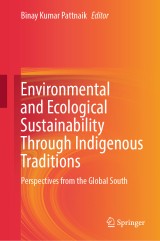Details

Environmental and Ecological Sustainability Through Indigenous Traditions
Perspectives from the Global South|
117,69 € |
|
| Verlag: | Springer |
| Format: | |
| Veröffentl.: | 26.07.2024 |
| ISBN/EAN: | 9789811970795 |
| Sprache: | englisch |
Dieses eBook enthält ein Wasserzeichen.
Beschreibungen
<p>This book explores the environmental and ecological wisdom inherent in some of the indigenous traditions of traditional communities from developing societies like, Argentina, Brazil, India, Mexico, Sri Lanka, and Thailand. It throws light on how these discrete and unrecognized traditions have enabled communities to live in harmony with nature for ages. Despite the best efforts of the modern states through policy-making, intensive R&D for eco-friendly technologies and products, social and environmental impact assessment studies (SEIAS), and cost benefit analysis (CBA) of projects, environmental and ecological degradation continues, mostly in developing societies, which house large number of traditional communities. This book explores their traditions consisting of world views or cosmologies, eco-savvy-customs, indigenous knowledge systems involving community-based occupations and practices, skills and crafts, and so on. This book shows that when interpreted in consonance with scientific environmentalism, these traditions reveal their inbuilt environmental wisdom, mirroring sacredness of nature that have instilled built-in conservation practices, are key to sustainability.</p><p>The conception of indigenous traditions that subsume environmental and ecological sustainability as well as cultural identity is studied in the book, from the vantage of multi-disciplinary perspectives. This book reflects two streams of thought : (i) stream of social anthropology, arguing for the inbuilt strength of indigenous traditions, that necessitate empathetic understanding with their own rights for recognition and survival, and (ii) stream of indigenous knowledge systems being technically effective only necessitate validation and certification by modern scientific knowledge system for wider use.</p><p> </p><p>The book is of great use to policy-makers and non-government players, in addition to researchers and academicians working in the area of sustainable development and indigenous / traditional communities.</p><p></p>
Ecological bases of Indian Traditions: Search for an Indigenous Vision.- Forests, folklores and religion: understanding Embedded ‘ecological wisdom’ in the Sundarbans, West Bengal, India.- Governing the Commons with Traditional knowledge and Practices: Lessons from Bishnoi community of India.- Cultural Practices of the Totonacs of Veracruz Vrs Neoliberal Reforms : A case for the recovery of the sacred.- The Philosophy of Sufficiency Economy and Sustainability: Achieving A Sustainable Environment from the Thai Perspective.- Indigenous Knowledge and Biodiversity Conservation: An Approach to Epistemic Fairness and New Citizenship in Mexico.- Ecological Knowledge and Sustainable Farming Practices among the Naga Tribes: A Reappraisal of their Worldviews.- Partnering with the Mountains for Reclaiming their Land: Conflict between Indigenous and the Capitalist Perspectives.- Sustainability and Ecological Intervention: Comparing Geoengineering and Amazonian Shamanism.- From Nature, to Nature: Articulating the discourse of environmental sustainability in a Chhau Dance community of West Bengal.- Practicing sustainable Irrigation management through Indigenous Knowledge: Experiences from Sri Lanka.- Indigenous knowledge in Agricultural Production.- Indigenous Seed Conservation Practices in Western Himalaya: A Case Study of Mandakini Valley, Uttarakhand, India.- Indigenous Knowledge and Sustainable Management of Natural Resources in Garhwal Himalaya, Uttarakhand, India.- Ethnobiological perspective to Bioresource conservation among the Indian communities.- Sustainability as a social encounter – A Dialogue among heterogenous knowledge systems for the management of forest in the Gran Chaco wetlands of Argentina.<p></p>
<p><b>Binay Kumar Pattnaik</b> is currently working in the Dept. of Humanities and Social Sciences, Indian Institute of Technology Kanpur, India as a senior professor. He has worked as the Director (VC) of Institute of Social and Economic Change, Bangalore. With three and half decades of experience in teaching and research at both IIT Bombay and IIT Kanpur, he has contributed handsomely to the area of social studies in science and technology, globalization and social movement studies. So far he has written and edited ten books including guest edited volumes of a few prestigious academic journals. That apart, his scholarly contributions include more than four dozen research papers in refereed journals of repute and articles in edited books. He has travelled extensively both inside and outside India to deliver lectures, keynote/ valedictory addresses and organize international sessions and symposia. Besides, he is a committed teacher andresearch guide of reputation</p><br><p></p><p></p>
<p>This book explores the environmental and ecological wisdom inherent in some of the indigenous traditions of traditional communities from developing societies like, Argentina, Brazil, India, Mexico, Sri Lanka, and Thailand. It throws light on how these discrete and unrecognized traditions have enabled communities to live in harmony with nature for ages. Despite the best efforts of the modern states through policy-making, intensive R&D for eco-friendly technologies and products, social and environmental impact assessment studies (SEIAS), and cost benefit analysis (CBA) of projects, environmental and ecological degradation continues, mostly in developing societies, which house large number of traditional communities. This book explores their traditions consisting of world views or cosmologies, eco-savvy-customs, indigenous knowledge systems involving community-based occupations and practices, skills and crafts, and so on. This book shows that when interpreted in consonance with scientific environmentalism, these traditions reveal their inbuilt environmental wisdom, mirroring sacredness of nature that have instilled built-in conservation practices, are key to sustainability.</p><p>The conception of indigenous traditions that subsume environmental and ecological sustainability as well as cultural identity is studied in the book, from the vantage of multi-disciplinary perspectives. This book reflects two streams of thought : (i) stream of social anthropology, arguing for the inbuilt strength of indigenous traditions, that necessitate empathetic understanding with their own rights for recognition and survival, and (ii) stream of indigenous knowledge systems being technically effective only necessitate validation and certification by modern scientific knowledge system for wider use.</p><p> </p><p>The book is of great use to policy-makers and non-government players, in addition to researchers and academicians working in the area of sustainable development and indigenous / traditional communities.</p><p></p>
Highlights the grassroot-based indigenous knowledge systems for sustainable development that are otherwise ignored Suggests explicating the rationality of the so called irrationality of traditional knowledge system Offers a bottom up approach to development for ensuring sustainability in developing economies


















